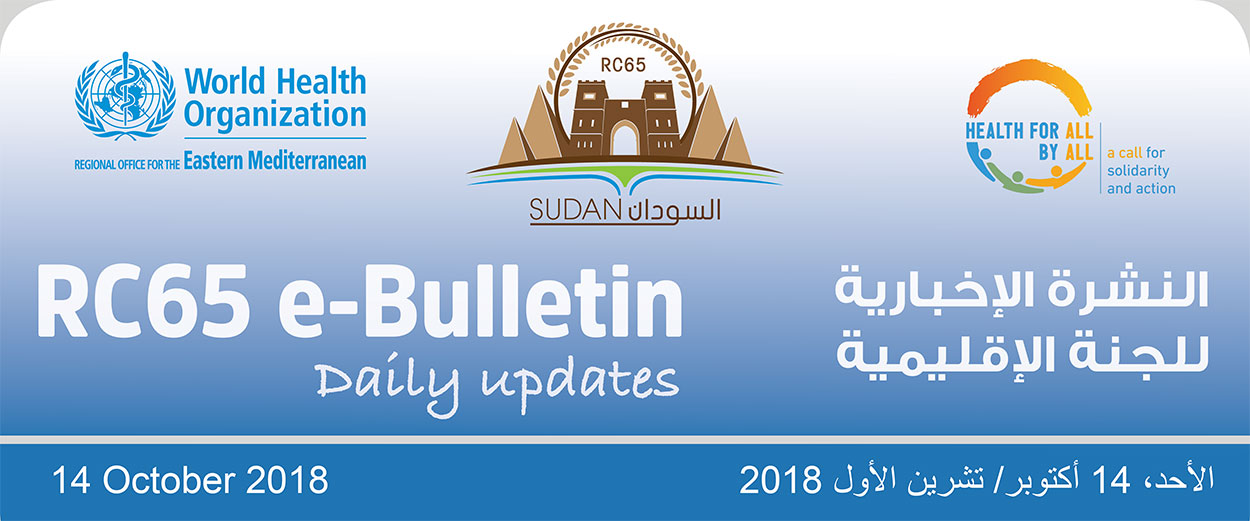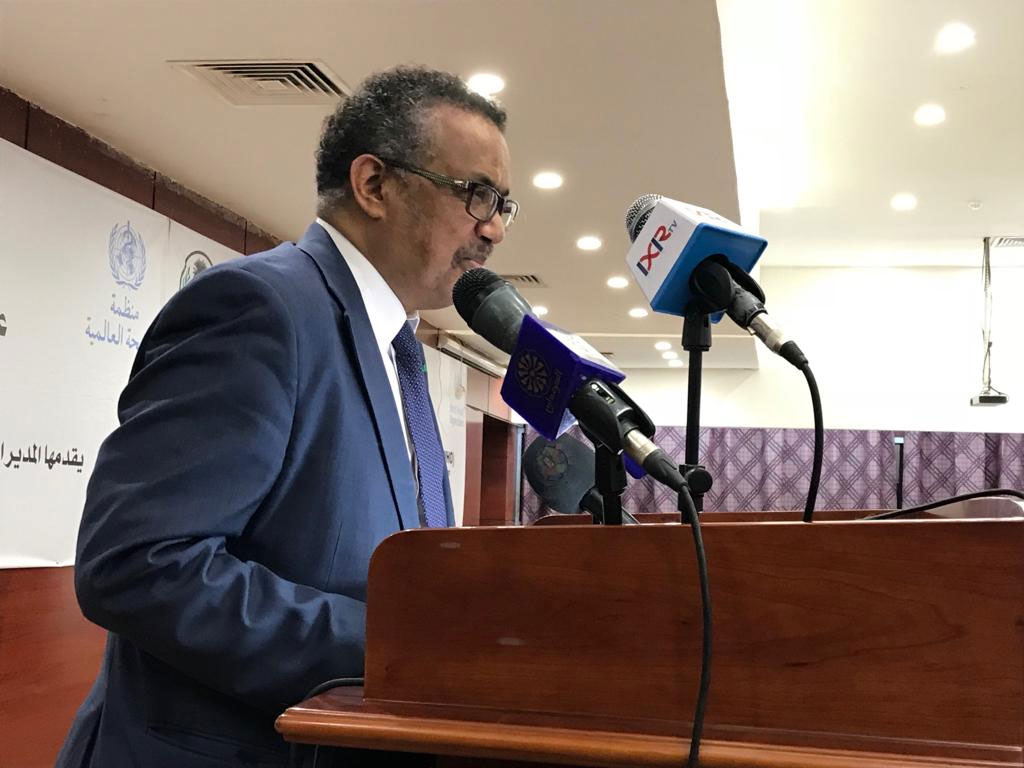

Lecture by
Dr Tedros Adhanom Ghebreyesus
WHO Director-General
“Health for all in the context of the Sustainable Development Goals”
Khartoum, Sudan 14 October 2018
Your Excellency Mr Mohamed Abu Zeid Mustafa, Federal Minister of Health of Sudan,
Dr Ahmad Al Mandhari, WHO Regional Director,
Excellencies, distinguished guests, colleagues, ladies and gentlemen,
It’s such an honour to be here in Khartoum. I always love coming home to Africa. Perhaps more than anywhere else in the world, it’s here in Africa that the battle for the Sustainable Development Goals will be won or lost.
It’s here in Africa that the inequalities of our world are most painfully apparent.
And yet it’s here in Africa that our world’s future lies.
It’s Africa that is home to the world’s richest resources – not the resources underground, but the resources above ground – the hope and vitality of Africa’s young people.
Africa is home to the world’s youngest population and some of the world’s fastest-growing economies. So we have many reasons to be optimistic. But we also have many causes for celebration.
Since the year 2000, Africa has made great progress against several of the leading causes of death and disease.
Life expectancy has increased on this continent by 10 years, faster than anywhere else in the world. Infant and maternal mortality have declined; we’ve turned the tide on the HIV epidemic, malaria deaths have halved – and we could list many more successes.
But progress has been uneven, both between and within countries. There is still a 31-year discrepancy between the countries with the shortest and longest life expectancies.
While some countries have made impressive gains, national averages hide the fact that some communities have been left behind.
That’s why the SDGs are so important. They represent an ambitious vision of the healthier, more prosperous, inclusive and resilient world we all want – for everyone. Although only one of the 17 goals is explicitly devoted to health, there are many health targets in the other goals. And health either contributes to or benefits from all of the goals. The Deputy Secretary-General, Amina Mohammed, calls SDG 3 a “docking station” for the other goals.
One of the key features of the SDGs is that they are “integrated and indivisible” – none can be achieved without progress on the rest.
For example, universal health coverage can help to reduce poverty by protecting people from a major cause of financial hardship; good health can fuel employment and economic growth; and strong health systems provide a defence against the social and economic consequences of outbreaks and other health emergencies.
Conversely, human health will benefit from progress towards the other goals. Better housing can reduce the incidence of several diseases; cleaner energy can improve air quality and prevent respiratory illness; and building stronger institutions can help to minimise corruption and inefficiency in the health sector.
That’s why it’s vital that we break out of our siloes and work across sectors in a collaborative way. Of course, we need a strong health sector to achieve the health-related targets in the SDGs. But some of the biggest gains in health over the next 13 years are likely to come from outside the health sector. It’s therefore vital that governments consider the health impacts in all areas, from urban planning to manufacturing and trade.
Ladies and gentlemen,
As you know, WHO is also celebrating a birthday this year – our 70th. WHO was founded in 1948 on the conviction that health is a right for all people, not a luxury for the few.
At the World Health Assembly in May, WHO’s Member States approved our new strategic plan for the next five years.
At its heart are what we call the “triple billion” targets:
1 billion more people benefitting from universal health coverage;
1 billion more people better protected from health emergencies;
And 1 billion more people enjoying better health and well-being.
They are ambitious targets. But they’re not new. They’re simply the targets we must all achieve together to stay on track for the SDGs.
Our top priority is universal health coverage.
My first experience of universal health coverage was as a student in Denmark in the 1980s. That was the first time I had health insurance. I couldn’t believe that even as a foreign student, all my health needs were covered.I had a similar experience as a Masters student in the UK, when I became a beneficiary of the National Health Service. Those experiences made a deep impression on me. They made me ask, why can’t we do the same in Ethiopia? Why can’t we do the same in Africa? Why can’t we do the same right here in Sudan?
They are questions I continue to ask. They are questions we must all continue to ask.
Our vision is that all people can access the health services they need, when and where they need them, without facing financial hardship. No one should have to choose between sickness and poverty.
But as we speak, more than half the world’s population lacks access to essential health services, like vaccination, treatment for tuberculosis and HIV, access to family planning, cancer screening, and the ability to see a health worker.
Even when services are available, using them can mean financial disaster. Every year, almost 100 million people are pushed into extreme poverty by the costs of paying for care out of their own pockets. This is one of the greatest injustices of our time. We have a moral duty to fix it.
The foundation of universal health coverage is strong health systems, based on people-centred primary health care, with a focus on health promotion and disease prevention.
Instead of health systems based on treating sick people in hospitals, we need systems that keep people healthy and out of hospitals, where the costs are greater, and the outcomes are often worse.
When people can access the health services they need near their homes, diseases can be prevented, or detected early and treated.
In just 10 days’ time I will be in Astana, Kazakhstan, for the Global Conference on Primary Health Care. Together with other leaders, we will celebrate the 40th anniversary of the Alma Ata Declaration, and we will recommit to primary health care as the foundation of universal health coverage.
But the benefits of primary care and universal health coverage go far beyond health.
They reduce poverty, by eliminating one of its causes. They drive inclusive economic growth, by keeping people out of hospitals and enabling them to be productive members of their society. They promote gender equality, by ensuring all people have equal access to health services. And they create jobs for health workers.
Yes, achieving universal health coverage requires new investments. But that’s what they are – investments, not costs.
We must not think that UHC is a luxury that only rich countries can afford. It’s achievable and affordable for all countries, at all income levels. In fact, a recent WHO study predicts that 85% of the cost of achieving UHC and the other SDG health targets in low- and middle-income countries can be met with domestic resources.
So although UHC takes economic investment, it’s not fundamentally an economic choice. It’s a political choice.
The good news is, countries all over the world are making that choice.
Countries like Rwanda and Thailand are living proof that all countries at all income levels can make progress towards UHC with the resources they have.
India is now rolling out a massive initiative called Ayushman Bharat, which could be the world’s single-biggest public health insurance scheme.
In Kenya, President Kenyatta has made affordable health care one of four pillars of the economy. We’re working with his government to design a new health financing system.
And here in Sudan, your national health policy from 2017 to 2030 is a solid platform for making progress towards universal health coverage and the SDGs. Its focus on strengthening the health system, and a health-in-all-policies approach is exactly right.
At a regional level, the adoption of the Salalah Declaration on UHC by all Member States of the Eastern Mediterranean region last month is a powerful statement. I congratulate you for this milestone. The challenge now is to back up your commitments with investments and action.
I also see strong political leadership at the global level.
Earlier this year, the Chancellor of Germany, Dr Angela Merkel, the President of the Republic of Ghana, Mr Nana Addo Akufo-Addo, and the Prime Minister of Norway, Ms Erna Solberg, wrote a joint letter asking WHO to lead the development of a “Global Action Plan for the health-related SDGs.
This is a strong signal that the international community is looking to WHO to provide leadership at a global level to reduce the fragmentation, duplication and inefficiency that have too often undermined progress.
This week we will be presenting phase 1 of the Global Action Plan at the World Health Summit in Berlin. Importantly, 11 global health agencies have come together to develop the plan and identify ways of working together to reduce duplication and accelerate progress towards the SDGs.
Ladies and gentlemen,
Let me leave you with three recommendations for Sudan and for the region.
First, the key ingredient for achieving the SDGs is political will. I know from my own experience that with strong political commitment from the highest levels, anything is possible. Without it, progress is very slow.
It starts with the recognition that health is a rights issue – an end in itself.
You all have a role to play in mobilising political leadership, from grassroots activists to cabinet members – you can all use your voices.
When the people speak with one voice, politicians listen.
Second, do not believe that universal health coverage is a privilege that only rich countries can afford. As I have said, there are plenty of countries at all income levels demonstrating what is possible.
Social solidarity is key – a system in which the healthy and rich subsidise the sick and poor benefits everyone in the long term.
Governments can also take steps to mobilise domestic resources by increasing taxes on tobacco, alcohol and sugary drinks. This can help to reduce consumption of harmful products, and generate revenue for the health system.
Third, achieving better health and well-being is not a job for the health sector alone. In fact, many of the determinants of health lie outside the health sector – like the environment in which people live and work, the food they consume, the roads they use, and so on.
So all of us must work across sectors with a health-in-all policies approach.
There are no quick fixes and no magic bullets. But there are proven tools. WHO’s job is support every country with the best evidence and the technical know-how to turn plans into results.
Sometimes the challenges seem too daunting. Sometimes the obstacles seem insurmountable.
But as Nelson Mandela said, it always seems impossible until it is done.
Thank you so much. Shukraan jazeelan.









